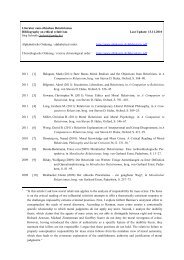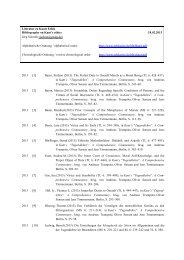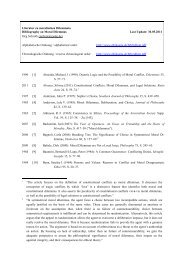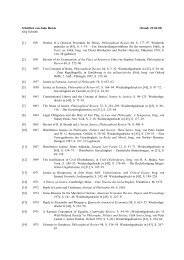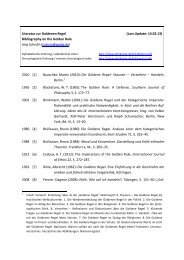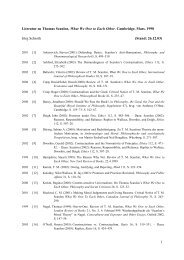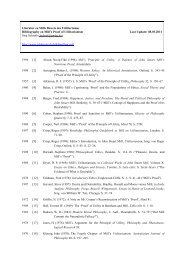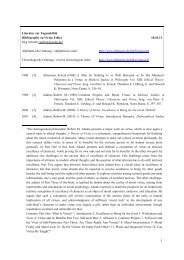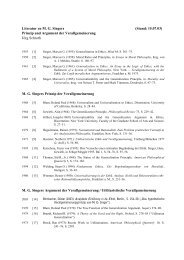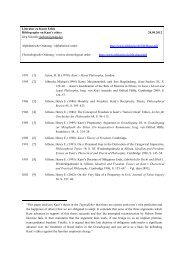Bibliography on Brad Hooker's Rule-consequentialism - Ethikseite
Bibliography on Brad Hooker's Rule-consequentialism - Ethikseite
Bibliography on Brad Hooker's Rule-consequentialism - Ethikseite
Create successful ePaper yourself
Turn your PDF publications into a flip-book with our unique Google optimized e-Paper software.
Defence of Esoteric Morality, Ratio 23, S. 34–58: S. 44–51. 3 – Vgl. dazu:<br />
Hooker, Publicity In Morality: A Reply to Katarzyna De Lazari-Radek and<br />
Peter Singer, Ratio 23, S. 111–17.<br />
2010 [4] Smith, Holly M. (2010): Measuring the C<strong>on</strong>sequences of <strong>Rule</strong>s, Utilitas 22, S.<br />
413–433. 4<br />
2009 [5] Portmore, Douglas W. (2009): <strong>Rule</strong>-C<strong>on</strong>sequentialism and Irrelevant Others,<br />
Utilitas 21, S. 368–76. 5<br />
2009 [6] Wall, Edmund (2009): Hooker’s C<strong>on</strong>sequentialism and the Depth of Moral Experience,<br />
Dialogue 48, S. 337–51. 6<br />
2008 [7] Hooker, <strong>Brad</strong> (2008): <strong>Rule</strong>-c<strong>on</strong>sequentialism versus Act-c<strong>on</strong>sequentialism, Noti-<br />
zie di Politeia 24, S. 75–85.<br />
2008 [8] Hooker, <strong>Brad</strong>/Fletcher, Guy (2008): Variable versus Fixed-Rate <strong>Rule</strong>-Utilitarian-<br />
ism, Philosophical Quarterly 58, S. 344–52. 7 – Zu [17].<br />
3 “Sidgwick's defence of esoteric morality has been heavily criticized, for example in Bernard Williams's<br />
c<strong>on</strong>demnati<strong>on</strong> of it as 'Government House utilitarianism.' It is also at odds with the idea of morality<br />
defended by Kant, Rawls, Bernard Gert, <strong>Brad</strong> Hooker, and T.M. Scanl<strong>on</strong>. Yet it does seem to be an<br />
implicati<strong>on</strong> of c<strong>on</strong>sequentialism that it is sometimes right to do in secret what it would not be right to do<br />
openly, or to advocate publicly. We defend Sidgwick <strong>on</strong> this issue, and show that accepting the possibility<br />
of esoteric morality makes it possible to explain why we should accept c<strong>on</strong>sequentialism, even while we<br />
may feel disapproval towards some of its implicati<strong>on</strong>s.”<br />
4 “Recently two distinct forms of rule-utilitarianism have been introduced that differ <strong>on</strong> how to measure the<br />
c<strong>on</strong>sequences of rules. <strong>Brad</strong> Hooker advocates fixed-rate rule-utilitarianism (which measures the expected<br />
value of the rule’s c<strong>on</strong>sequences at a 90 percent acceptance rate), while Michael Ridge advocates<br />
variable-rate rule-utilitarianism (which measures the average expected value of the rule’s c<strong>on</strong>sequences<br />
for all different levels of social acceptance). I argue that both of these are inferior to a new proposal,<br />
optimum-rate rule-utilitarianism. According to optimum-rate rule-utilitarianism, an ideal code is the code<br />
whose optimum acceptance level is no lower than that of any alternative code. I then argue that all three<br />
forms of rule-utilitarianism fall prey to two fatal problems that leave us without any viable form of rule-<br />
utilitarianism.”<br />
5 “In this article, I argue that <strong>Brad</strong> Hooker’s rule-c<strong>on</strong>sequentialism implausibly implies that what earthlings<br />
are morally required to sacrifice for the sake of helping their less fortunate brethren depends <strong>on</strong> whether<br />
or not other people exist <strong>on</strong> some distant planet even when these others would be too far away for<br />
earthlings to affect.”<br />
6 “In Ideal Code, Real World, <strong>Brad</strong> Hooker seeks to offer a versi<strong>on</strong> of ideal rule c<strong>on</strong>sequentialism that is<br />
immune from standard criticisms. I will attempt to challenge Hooker’s ideal rule-c<strong>on</strong>sequentialist theory<br />
by arguing that there are philosophical problems at the ultimate foundati<strong>on</strong> of his maximizing<br />
c<strong>on</strong>sequentialist and pluralist approach toward well-being and other basic goods. I find that no amount of<br />
revisi<strong>on</strong> is likely to insulate his approach from standard criticisms. I suggest that any maximizing rule-<br />
c<strong>on</strong>sequentialist approach toward well-being, taken in a rich and pluralist sense, is likely to fall prey to<br />
standard criticisms. In later work, Hooker drops ideal rule c<strong>on</strong>sequentialism in favor of an incremental<br />
rule-c<strong>on</strong>sequentialist approach. That piecemeal approach is also challenged in this paper.”



